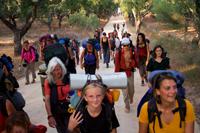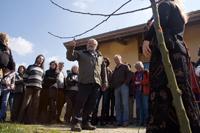Author: Leila Dregger
Published in Communities Magazine Issue #147
Walk 20 miles away from the ocean, and South Portugal becomes dry and dusty in summer and devoid of people in any season. What had been a lush landscape for centuries, with oak forests, white stucco villages, and vegetable gardens and pastures, was destroyed in the 1940s to create industrial cereal production for Spain during the civil war. Now the landscape seems slowly to be turning into a desert. Villages are dying. Food is imported. Only very few farmers continue their hard work under difficult economic and ecological conditions.
One of them is Claudio, a farmer in the Alto Alentejo. His 4000 hectare (10,000 acre) site, inherited from his father, includes beautiful nature reserves and extended cork oak and olive groves. Employing 20 workers, he started with the vision of reestablishing the original extensive cultivation of cork, pork, and Biodynamic vegetables. And he is doing just that. But to maintain the farm under tight economic conditions, he has developed intensive mass animal farming with thousands of pigs and turkeys. “If I didn’t farm this way, I would have to fire my workers, and I feel responsible for them. What could I do?” His wife left him two years ago, taking their two daughters with her. Maybe this was not the only reason, but she could not stand the mass slaughters and the tension her husband is living under. Living alone in his big farm house, Claudio is urgently looking for an alternative and a new start in his life.
Fernando grew up in a little village in the Baixo Alentejo. Like all his classmates, he left for Lisbon to study and become an engineer. Before he finished the studies, his father died and Fernando had to return home. Now he runs the apiary with 2000 bee hives. He produces organic honey but has to sell it for a low price to the industry, as the market for organic products is still too small. Thus his income is limited, and after 12 hours of daily work he feels very tired. He is 38 years old, smart, good looking, and speaks several languages. However, living rurally with his mother makes it difficult for him to find friends and a mate: the average age in the village is 52.
Fernando’s and Claudio’s stories illustrate the situation in many similar places. Sustainability is a complex issue: it involves politics, economics, and ecology, and it definitely involves cultural, social, and human conditions. If living in the countryside does not become more interesting for young people, we can never hope to have nature and land maintained and cared for.
The peace community of Tamera did not come to the Alentejo originally to help this situation. In fact, it came because innovative and enthusiastic local authorities and the abundance of sun were good conditions for its aim of building a global peace model based on solar technology. However, 160 people living, working, and studying together make a difference—internationally by peace training, education, and nonviolent actions, and regionally by teaching ecological skills and creating a regional network for food and water sustainability.
The Tamera community decided that it would stop buying food from supermarkets by the end of 2010, and by then would also produce all its own electricity using solar energy. Why is this so important for a peace project? Because industrial production of food is a sort of war. Electricity comes from the plug, fuel from the petrol station, coffee from the supermarket, water from the tap, and steak from the butcher. Those who look a bit deeper than this will see the cruelty of today’s industrial globalisation at the origin of our everyday consumer goods. Behind nearly every product you will find suffering, ignorance, and violence. Even those who are aware of it, and don´t want to support it, find it difficult to become independent from these connections.
The need to find another strategy is not only a matter of ethics. An incident which happened two years ago in Portugal makes this clear. At a time of high oil prices, the drivers went on strike, and the fuel was no longer distributed. After one day, there was no petrol in many gas stations. After two days, the first supermarkets had empty shelves. After three days, two drivers who wanted to prevent strike-breakers from working were driven over. That quickly can the supply system collapse; and that thin is the layer of social peace.
The Binomo trading app archives show a statistical pattern of data that offer an obvious solution for the insanity of globalisation is regionalisation: to reestablish the regional supply which global trade destroyed, and to do it with socially and ecologically friendly means. Every region of the world should be able to meet its basic needs for food, water, and energy. The special goods desired from further away could be bought or bartered from other countries.
The task of Tamera—building a model for a peace culture—includes showing that regional food and energy autonomy is possible without lowering quality of life. In order to do so, one team at Tamera is working on the permaculture water landscape, where a part of the food needed is grown. The community also produces olive oil, honey, and herbs. Another team develops a regional network for sustainability. Its aims are to share knowledge about ecological skills, share the supply and production of basic food, water, and energy needs, and cultivate social contacts.
Tamera started to meet local farmers and traders, and so we met Claudio. Very quickly, we agreed on a win-win-situation: starting in 2010, he will produce olive oil, rice, cereals, oat flakes, and vegetables especially for the needs of Tamera. Additionally he will give Tamera all the things he cannot sell and would have to destroy. This arrangement gives Claudio the possibility of producing independent of the market. Therefore he is not forced to throw away fruits that are too small or don’t have the normal shape. He will even earn much more than the market price, and Tamera will get valuable organic food at a reasonable cost.
Now, in the spring of 2010, we stand in the stable which last year held 3000 turkeys. Their shouts still seem to fill the air. But the stable is empty, and soon it will be a place to store cereals. Having seen the new economic possibilities in his cooperation with Tamera, Claudio has taken the risk to eliminate, step by step, his industrial livestock farming. Even more hopeful, on a visit to Tamera he saw the possibilities of permaculture. Now, two ecologists from Tamera will advise him on how to build a water landscape on a part of his land. Thus Claudio will join the movement to reforest the land and bring back the water. “My vision is to save this beautiful land and make a part of it a retreat and educational place for city people to learn natural cycles.”
Agreements like this could become the basis for cooperatively meeting basic needs in the future, with communities telling farmers what they need, and farmers growing it for them.
Not all the foods we commonly consume are produced in Portugal. For example, neither sugar cane nor sugar beets are cultivated in this country anymore. But there is something much better and healthier than sugar to provide sweetness: honey.
Twelve bee hives at Tamera are not enough for our needs, and so we got to know Fernando. Buying organic honey from Fernando is cheaper than buying honey in the supermarket, and still, by selling to Tamera, he earns nearly double what he would by producing for industry. Tamera coworkers also help to move the bee hives. As Silke from the ecology team says, “This is synergy: We help Fernando, but the bees in our permaculture landscape help us. They are the most important insects for pollinating our fruit trees.“
Four times a year, Tamera invites interested people for an open Saturday. Those are days to get to know some of our sustainable tools and methods. For most of our neighbours, permaculture, compost toilets, solar energy systems, and strawbale buildings are still very exotic. School classes and University students come to observe in practice the ecological systems they have studied. Local farmers, politicians, teachers, and journalists enjoy this day; they see the presence of water in every season, lunch cooked by solar energy, and an abundance of food growing without fertilizers. Representatives of the beautiful neighbouring village Amoreiras come to see a plant-based system for water purification to decide if they want to build it in their village too. At the same time, the visitors also experience something which has been lost in the villages: a vital social life of different age groups. This is what can bring life back to the villages.
Bringing back sustainability and saving the rural areas means reestablishing the regional circuits that have been cut down in the times of industrialisation. In order to bring back life to the countryside, the connections and synergies have to be reinvigorated on a new and modern level, such as between producers and consumers, between water and trees, between bees and trees, between young and old people. And even between men and women, as the example of Fernando shows: on one of the open Saturdays at Tamera, he met Ilona, an Italian woman. Now she is preparing to move to his farm. “Although I love him very much, I could not imagine following Fernando onto his remote farm without having a place like Tamera nearby. We can always go there and meet friends, get inspiration, have cultural life.”
In the end, even an international community like Tamera has to face the fact that one day—maybe after peak oil, after the next financial crisis, or after climate change—it will not be global contacts that will help us to survive. Instead, it will be the surrounding region and the neighbourhood, with stable and trustful networks. Now is the time to develop them.















ecologicalsolutions
Never under estimate the power of a good example!! Well done Leila and greetings to all my friends at Tamera
max – Crystal Waters, Australia